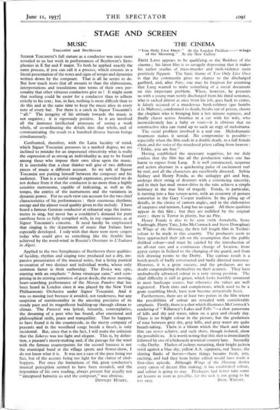MUSIC
STAGE AND SCREEN
Toscanini and Beethoven
SIGNOR TOSCANINI'S full stature as a conductor was once more revealed to us last week in performances of Beethoven's Sym- phonies in E flat and F major. To both he applied exactly the same process, if you can call it a process, which consists in a literal presentation of the notes and signs of tempo and dynamics written down by the composer. That is all he seems to do. But how much more that all mounts to than the elaborations, interpretations and translations into terms of their own per- sonality that other virtuoso conductors give us ! It might seem that nothing could be easier for a conductor than to adhere -strictly to his text; but, in fact, nothing is more difficult than to do this and at the same time to keep the music alive in every note of every bar. For there is a catch in Signor Toscanini's "all." The integrity of his attitude towards the music is not negative ; it is vigorously positive. In it are involved all the immense intellectual processes of seeing a work whole, of co-ordinating the details into that whole, and of communicating the result to a hundred diverse human beings simultaneously.
Confronted, therefore, with the Latin lucidity of mind, which Signor Toscanini possesses in a marked degree, we are inclined to mistake for an impersonal objectivity what is really the expression of as-strong an individuality as any to be found among those who impose their own ideas upon the music. It is inevitable that a clear thinker will give of two different pieces of music a different account. So we talk of Signor Toscanini not• putting himself between the composer and his audience. That is a useful enough expression, provided we do not deduce from it that the conductor is no more than a highly sensitive metronome, capable of indicating, as well as the tempo, the entries of the instruments and the variations in dynamic power. For no such view can account for the two chief characteristics of his performances : their enormous rhythmic energy and the almost vocal quality given to the melody. I have heard a famous German conductor at rehearsal urge the instru- ments to sing, but never has a conddctor's demand for pure cantilena been so fully complied with, in my experience, as at Signor Toscanini's concerts. It need hardly be emphasised that singing is the department of music that Italians have especially developed. I only wish that there were more singers today who could give us something like the flexible line achieved by the wood-wind in Rossini's Overture to L'Italiana in Algeti.
Applied to the two Symphonies of Beethoven these qualities of lucidity, rhythm and singing tone produced not a dry, im- passive presentation of the musical notes, but a living poetical re-creation of two distinct and individual works, whose only common factor is their authorship. The Eroica was epic, starting with an emphatic " Arma virumque cano," and com- prising in its stirring narration of great deeds, the most moving, heart-searching performance of the Marcia Funebre that has been heard in London since it was played by the New York Philharmonic Orchestra under Signor Toscanini. And it was so moving just because it avoided, not tenderness, but any suspicion of sentimenftlity in the amazing precision of its steady pace and its magnificent building-up through climax to climax. The Pastoral was lyrical, leisurely, contemplative, the dreaming of a poet who has found, after emotional and philosophical strife, peace and tranquillity. That he happens to have found it in the countryside, in the merry company of peasants and in the woodland songs beside a brook, is only incidental. But, since that is the fact, I will make the criticism that the Scherzo was too light and elegant. This is, by defini- tion, a peasant's merry-making and, if the passage for the wind with the famous counterpoints for the second bassoon is not the municipal band at the village sports and flower-show, I do not know what it is. It was not a case of the pace being too fast, but of the accents being too light for the clatter of clod- hoppers. For, once the limitations of this great conductor's musical perception seemed to have been revealed, and the imposition' of his own reading, always piesent but usually not " inteiposed betwieh us and the composer," was obviems.
Dvtnuiv - }fussy/.
























































 Previous page
Previous page